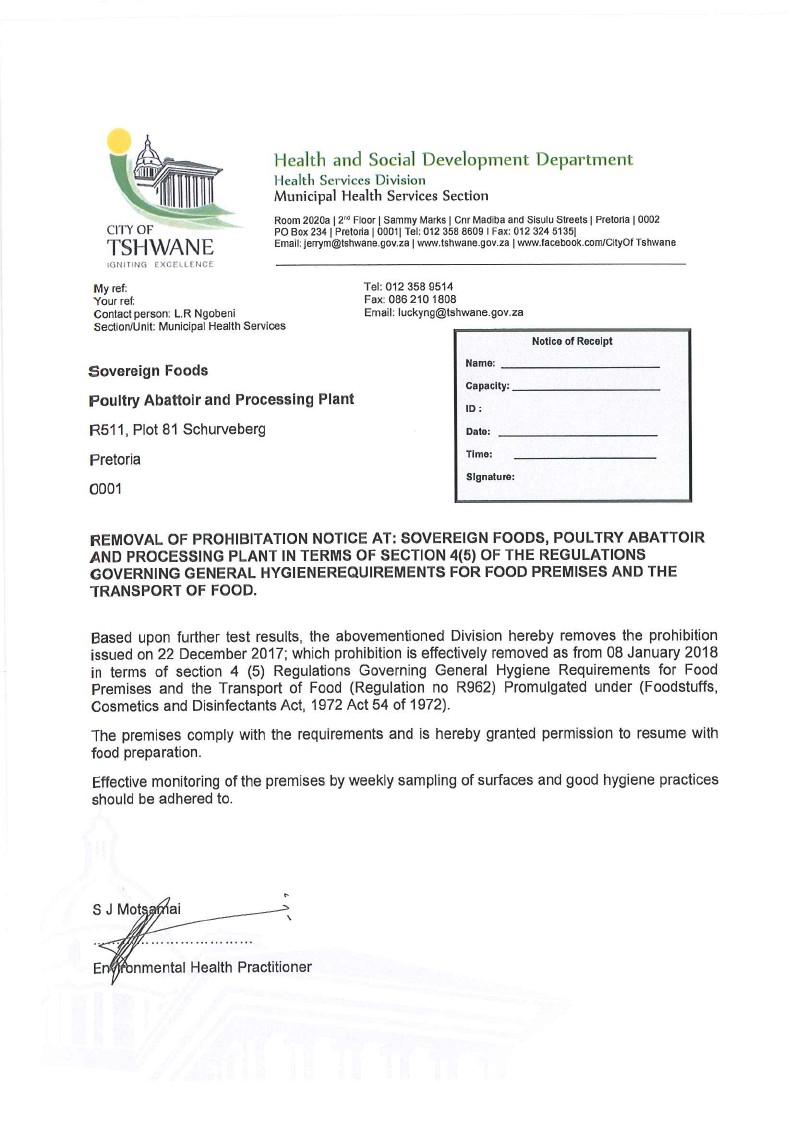Sovereign Foods welcomes Lift of Prohibition at Hartbeespoort Plant
Sovereign Foods today announced that the City of Tswhane’s Health and Social Development and the Department of Health (DOH) has lifted the prohibition notice imposed on its plant in Hartbeespoort on 27 December 2017 for the Listeria bacterium. (SEE: Attachment below)
In a statement yesterday at a press conference in Pretoria, South African Health Minister Aaron Motsoaledi said: “At this juncture, we cannot conclude that the abattoir called Sovereign Foods is the source of the present outbreak.”
Commenting on the latest development, Blaine van Rensburg, Sovereign Foods Head of Production said: “Public health officials have not isolated listeria bacterium in the latest samples of our plant, and as a result they have lifted the prohibition notice. This was communicated from DoH’s legal representatives to our legal representatives at noon yesterday.”
“We are pleased that the prohibition has been lifted and the abattoir has been declared clean,” Van Rensburg said.
“Despite being declared clean and free of the Lysteria bacterium, we are further strengthening steps to render products safer than they already are,” Van Rensburg said.
The process entails the installation of several new carcass washing points “above and beyond the legislative requirements of the Department of Health (DOH) and the Department of Agriculture, Fisheries and Forestry (DAFF).”
“Sovereign Foods intends to further augment health, food and safety standards at its abattoirs above the requirements of our FSSC 22000 accreditation, and we believe we are now pioneering a new model of food safety at poultry abattoirs that can serve as best practice for the South African poultry industry.”
“It is important to note that South African law does not stipulate how, how often or with what you are required to wash the carcass. Typically you would expect to see a carcass washer after defeathering and in the evisceration line as a part of the process. Additional points would generally be considered above requirements.
“All these points are or will be proportionally dosed with alternating anti-microbial agents at optimal concentration in order to ensure microbial reduction. These anti-microbial agents are specifically selected for their oxidative reduction potential (ORP) and residual action which further mitigates potential cross contamination of the carcass during handling during portioning, trimming and packing.
“It is important to note that other plants typically have what can be described as ‘compliant’ under current legal requirements, namely, (a) washing of carcasses at one point and (b) usually an additional point prior to chilling similar to our set-up.
“We are now introducing five more washing points, and believe we are the first poultry abattoir in South Africa to introduce this system,” he said.

News Category
- International retailers
- On the move
- Awards and achievements
- Legislation
- Wine and liquor
- Africa
- Going green
- Supplier news
- Research tools
- Retailer trading results
- Supply chain
- Innovation and technology
- Economic factors
- Crime and security
- Store Openings
- Marketing and Promotions
- Social Responsibility
- Brand Press Office
Related Articles

Warning of Eskom collapse

Knorr recalls brown onion gravy sachets

Eskom CEO shares good news about load-shedding

Tax warning for South African businesses


